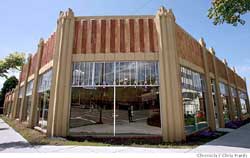From auto showroom to Buddhist center
by Patrick Hoge, San Francisco Chronicle Staff Writer, May 9, 2005
San Francisco, CA, USA -- A Berkeley Art Deco building that once housed automobile dealerships run by the owner of famed racehorse Seabiscuit and by baseball great Reggie Jackson will become a major center for Buddhist learning.
 << The existing 22,000-square-foot building at 2140 Durant Ave.
<< The existing 22,000-square-foot building at 2140 Durant Ave.
When it opens next summer, the $14 million Jodo Shinshu Center will contain the offices of the Buddhist Churches of America, a library, bookstore, conference center-worship room, indoor patio garden and dormitory-style rooms for seminary students and visitors.
The San Francisco-based Buddhist Churches of America staged a groundbreaking ceremony for the center on Friday, when more than a dozen ministers chanted and tossed symbolic lotus flower petals into the air in front of a scroll bearing the image of the Buddha of Everlasting Light.
In leading the blessing ceremony, Bishop Koshin Ogui echoed the hope expressed by other church officials that the new center will help to spread Jodo Shinshu Buddhism to people who are not of Japanese descent.
"We're very excited about the potential for the transmission of Buddhism in the West,'' said David Matsumoto, minister of the nearby Berkeley Buddhist Center after the ritual breaking open of a sake barrel with wooden mallets.
The center will also house the Institute for Buddhist Studies, which the Buddhist Churches of America founded.
The church group bought the Berkeley building in 2003 for about $7 million and expects to spend almost $7 million more on renovations before opening, said Robert Noguchi, the group's fund-raising manager.
The existing 22,000-square-foot building at 2140 Durant Ave., a protected city landmark, was built by racehorse owner Charles Howard for his East Bay Buick dealership during the 1930s. Baseball legend Reggie Jackson ran a Chevrolet dealership there for less than year, but was unable to make a profit and closed in 1989.
The building will be expanded to 37,000 square feet, with two new floors added. Exteriors will complement but not mimic the original Art Deco styling, said Emeryville architect Sady Hayashida, a member of the Berkeley temple.
Jodo Shinshu is a non-monastic strain of Buddhism that emphasizes accessibility to lay practitioners. Its teachings were promulgated by Shinran Shonin, who lived in the 12th and 13th centuries.
The Buddhist Churches of America traces its beginnings to San Francisco in 1899, when two ministers arrived from Japan to serve immigrants.
Since then, the organization has played an important role in Japanese American affairs, particularly during the internments of World War II.
In 1987, the organization pressured the U.S. military to allow Buddhist chaplains in the armed forces -- the first time that chaplains outside the Judeo-Christian tradition had been represented.
The group now has 60 temples in the continental United States and claims 17,000 members, most of them concentrated in California and other parts of the West Coast. Members in Hawaii are affiliated with another administrative group.
About 4,400 adherents are in the Bay Area, including 323 in Berkeley, 417 in San Francisco and 1,288 in San Jose, Noguchi said. Sacramento has the most members in the state, at 1,500, although Los Angeles and Orange counties have seen strong growth and have similar numbers, according to Noguchi.
Gordon Bermant, the incoming president of the Buddhist Churches of America who was at Friday's ceremony, said he believes Jodo Shinshu will become "a major religious tradition in the United States.''
"The challenge for us is to take this beautiful message and make it available to everyone out there, not just those who grew up in it,'' said Bermant, a psychologist and lawyer who belongs to the Ekoji Buddhist Center in Fairfax Station, Va., just outside Washington, D.C.
Michuko Anzai, a Berkeley native were raised in the Jodo Shinshu tradition, said she would be happy if its principles were more widely adopted.
"It brings peace and calmness, compassion,'' Anzai said. "If there was more of that in the world, I think it would be a good thing.''

 << The existing 22,000-square-foot building at 2140 Durant Ave.
<< The existing 22,000-square-foot building at 2140 Durant Ave.